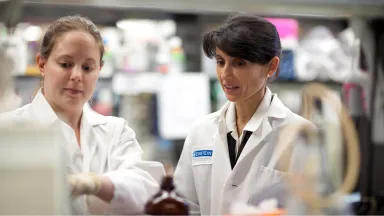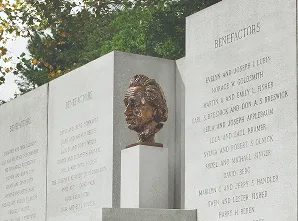
Praveen Agrawal, Ph.D.
- Assistant Professor, Department of Molecular Pharmacology
Area of research
- Role of altered glycosylation in tumor progression, metastasis and resistance to targeted therapy in melanoma and prostate cancer, tumor microenvironment, organ tropism in metastasis, effect of glycan branching on glycoprotein function
Phone
Location
- Albert Einstein College of Medicine Jack and Pearl Resnick Campus 1300 Morris Park Avenue Forchheimer Building 231F Bronx, NY 10461
Research Profiles
Professional Interests
Glycans (carbohydrates) can substantially influence and modulate protein structure and function in multiple ways such as protein folding, conformation, stability, activity etc. which directly impact key processes supporting tumor progression and metastasis, including cell adhesion, motility, invasion, signaling activation, cell-matrix interactions, immune evasion. We are specifically interested to study that what are the precise mechanisms by which biochemical and structural changes in glycans of a glycoprotein, regulate tumor progression and metastasis and resistance to various therapies.
1. Glycosylation as a regulator of tropism of melanoma metastasis: Malignant melanoma is one of the most aggressive cancers and can disseminate from a relatively small primary tumor and metastasize to multiple sites, including the lung, liver, brain, bone, and lymph nodes. Recently, we identified that a fucosyltransferase FUT8 is a driver of melanoma metastasis (Agrawal et al., 2017). Further, we postulated that adaptation of tumor cells to distinct secondary sites requires specific changes in cell surface glycosylation. To explore this idea and identifying glycan epitopes and glycogenes involved in site specific organ tropism of melanoma, we utilize multiple approaches such as glycomics and glycogenomics of in vivo melanoma metastasis models and clinical patient samples of melanoma. We aim to identify target glycoproteins and their mechanism of action which contributes in site-specificity of melanoma metastasis.
2. Investigation the biological role of L1CAM glycosylation in melanoma brain metastasis: Metastases to the brain are among the most clinically significant, because even a single one is likely to cause serious disability. In our previous study of melanoma, we showed that in vitro L1CAM cleavage is dependent on core fucosylation and a glycosylation site is adjacent to L1CAM cleavage site. L1CAM is known to express by metastatic cells for spreading along brain capillaries and for metastatic outgrowth. Currently, we are testing if modulation of glycosylation site/s affects L1CAM cleavage, protein-protein interactions, and brain metastasis capability using various biochemical approaches and in vivo brain metastasis models.
3. The role of glycosylation alteration in resistance to targeted therapy of Prostate cancer: In the past years, many therapeutic advances have been achieved in castration-resistant prostate cancer (CRPC), with the approval of several new drugs such as AR inhibitors abiraterone and enzalutamide which have shown an improvement in overall survival (OS) however sooner or later acquired drug resistance appears. As glycans are active players throughout cancer development and progression, we are identifying specific changes in glycosylation required for resistance to therapy of PCa. We utilize a multi-step systems biology approach including lectin microarray (Agrawal et al., 2014) and glycan mass spectrometry based glycomics, glycogene data mining of PCa clinical datasets, in vivo high-throughput functional screen with a barcoded glycogene shRNA/sgRNA library and identification of glycoprotein targets using lectin-affinity pulldown and mass spectrometry. These glycoproteins will be further analyzed for role of their glycosylation status and mechanism of action in PCa targeted therapy.
Selected Publications
- Biermann J, Melms JC, Amin AD, Wang Y, Caprio LA, Karz A, Tagore S, Barrera I, Ibarra-Arellano MA, Andreatta M, Fullerton BT, Gretarsson KH, Sahu V, Mangipudy VS, Nguyen TTT, Nair A, Rogava M, Ho P, Koch PD, Banu M, Humala N, Mahajan A, Walsh ZH, Shah SB, Vaccaro DH, Caldwell B, Mu M, Wünnemann F, Chazotte M, Berhe S, Luoma AM, Driver J, Ingham M, Khan SA, Rapisuwon S, Slingluff CL Jr, Eigentler T, Röcken M, Carvajal R, Atkins MB, Davies MA, Agustinus A, Bakhoum SF, Azizi E, Siegelin M, Lu C, Carmona SJ, Hibshoosh H, Ribas A, Canoll P, Bruce JN, Bi WL, Agrawal P, Schapiro D, Hernando E, Macosko EZ, Chen F, Schwartz GK, Izar B. Dissecting the treatment-naive ecosystem of human melanoma brain metastasis. Cell. 2022 Jul 7;185(14):2591-2608.e30. doi: 10.1016/j.cell.2022.06.007. https://pubmed.ncbi.nlm.nih.gov/35803246/
- Shadaloey AAS, Karz A, Moubarak RS, Agrawal P, Levinson G, Kleffman K, Aristizabal O, Osman I, Wadghiri YZ, Hernando E. A Robust Discovery Platform for the Identification of Novel Mediators of Melanoma Metastasis. J Vis Exp. 2022 Mar 8;(181). doi: 10.3791/63186. https://pubmed.ncbi.nlm.nih.gov/35343960/
- PMID: 35343960Kurz E, Chen S, Vucic E, Baptiste G, Loomis C, Agrawal P, Hajdu C, Bar-Sagi D, Mahal LK. Integrated Systems-Analysis of the Murine and Human Pancreatic Cancer Glycomes Reveal a Tumor Promoting Role for ST6GAL1. Mol Cell Proteomics, 2021 Oct 8;100160. https://pubmed.ncbi.nlm.nih.gov/34634466/
- Song WM*, Agrawal P*, Von Itter R, Fontanals-Cirera B, Wang M, Zhou X, Mahal LK, Hernando E, Zhang B. Network models of primary melanoma microenvironments identify key melanoma regulators underlying prognosis. Nat Commun. 2021 Feb 22;12(1):1214. *equal authorship https://pubmed.ncbi.nlm.nih.gov/33619278/
- Shukla S, Cyrta J, Murphy DA, Walczak EG, Ran L, Agrawal P, Xie Y, Chen Y, Wang S, Zhan Y, Li D, Wong EWP, Sboner A, Beltran H, Mosquera JM, Sher J, Cao Z, Wongvipat J, Koche RP, Gopalan A, Zheng D, Rubin MA, Scher HI, Chi P, Chen Y. Aberrant Activation of a Gastrointestinal Transcriptional Circuit in Prostate Cancer Mediates Castration Resistance. Cancer Cell, 2017 Dec 11;32(6):792-806. https://pubmed.ncbi.nlm.nih.gov/29153843/
- Fontanals-Cirera B, Hasson D, Vardabasso C, Di Micco R, Agrawal P, Chowdhury A, Gantz M, de Pablos-Aragoneses A, Morgenstern A, Wu P, Filipescu D, Valle-Garcia D, Darvishian F, Roe JS, Davies MA, Vakoc CR, Hernando E, Bernstein E. Harnessing BET Inhibitor Sensitivity Reveals AMIGO2 as a Melanoma Survival Gene. Mol Cell, 2017 Nov 16;68(4):731-744. https://pubmed.ncbi.nlm.nih.gov/29149598/
- Agrawal P, Fontanals-Cirera B, Sokolova E, Jacob S, Vaiana CA, Argibay D, Davalos V, McDermott M, Nayak S, Darvishian F, Castillo M, Ueberheide B, Osman I, Fenyö D, Mahal LK, Hernando E. A Systems Biology Approach Identifies FUT8 as a Driver of Melanoma Metastasis. Cancer Cell, 2017 Jun 12;31(6):804-819. https://pubmed.ncbi.nlm.nih.gov/28609658/
- Kurcon T, Liu Z, Paradkar AV, Vaiana CA, Koppolu S, Agrawal P, Mahal LK. miRNA proxy approach reveals hidden functions of glycosylation. Proc Natl Acad Sci U S A 2015 Jun 9;112(23):7327-32. https://pubmed.ncbi.nlm.nih.gov/26015571/
- Agrawal P, Kurcon T, Pilobello KT, Rakus JF, Koppolu S, Liu Z, Batista BS, Eng WS, Hsu KL, Liang Y, Mahal LK. Mapping posttranscriptional regulation of the human glycome uncovers microRNA defining the glycocode. Proc Natl Acad Sci U S A. 2014 Mar 18;111(11):4338-43. https://pubmed.ncbi.nlm.nih.gov/24591635/
- Pilobello KT, Agrawal P, Rouse R, Mahal LK. Advances in lectin microarray technology: optimized protocols for piezoelectric print conditions Curr Protoc Chem Biol. 2013;5(1):1-23. https://pubmed.ncbi.nlm.nih.gov/23788322/
- Agrawal P, Kumar S, Jaiswal YK, Das HR, Das RH. A Mesorhizobium lipopolysaccharide (LPS) specific lectin (CRL) from the roots of nodulating host plant, Cicer arietinum Biochimie. 2011 Mar;93(3):440-9. https://pubmed.ncbi.nlm.nih.gov/21055439/
- Agrawal P, Kumar S, Das HR. Mass spectrometric characterization of isoform variants of peanut (Arachis hypogaea) stem lectin (SL-I) J Proteomics. 2010 Jun 16;73(8):1573-86. https://pubmed.ncbi.nlm.nih.gov/20348039/
- Biswas S, Agrawal P, Saroha A, Das HR. Purification and mass spectrometric characterization of Sesbania aculeata (Dhaincha) stem lectin. Protein J. 2009 Dec;28(9-10):391-9. https://pubmed.ncbi.nlm.nih.gov/19847633/
- Pathak M, Singh B, Sharma A, Agrawal P, Pasha SB, Das HR, Das RH. Plant Mol Biol. 2006 Nov;62(4-5):529-45 Molecular cloning, expression, and cytokinin (6-benzylaminopurine) antagonist activity of peanut (Arachis hypogaea) lectin SL-I. https://pubmed.ncbi.nlm.nih.gov/16941222/





